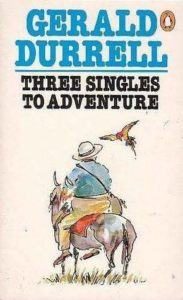 The phrase ‘procreative expletive’ in the book Three Singles to Adventure’ by India-born British naturalist, zookeeper, and conservationist Gerald Durrell hooked my attention, in the first instance, due to a local video that had gone viral recently leading to the courts, and I further say not on that matter.
The phrase ‘procreative expletive’ in the book Three Singles to Adventure’ by India-born British naturalist, zookeeper, and conservationist Gerald Durrell hooked my attention, in the first instance, due to a local video that had gone viral recently leading to the courts, and I further say not on that matter.
That phrase was there when I first read the book in the late 1960s (macaw on cover; there were umpteen cover designs by various publishing houses issued down the ages) as it was present when the book was first published in 1954, and in subsequent reprinting down the years into the new millennium, even when it was translated into various languages.
There are many other phrases that begged my attention during this current reading, some of which I will share herein. For instance, on one of their sorties, the group came upon a flock of tiny birds which raised the question of species to which the author replied, ‘Tanagra Violacea’ and received this from the questioner, ‘I can’t understand why you zoologists insist on burdening creatures with such awful names’. At the end of the book, there is an index of animals with their popular and zoological names like agouti – dasyprocta; electric ell – electrophros electricus; jaguar – felis onca; piranha – serrasalmo etc.
The other reason why I latched onto that phrase is because it is characteristic of Durrell’s writing which is ‘powerfully descriptive’ and humorous (and satirical) poking fun at himself and life around him, drawing you into the narrative. The other major and significant dimension of his writing was that his books written as potboilers to fund his zoological adventures and conservationist ventures. In other words, he had fun writing, sharing the fun with readers, all for a worthy cause.
Of the scores of books Durrell authored and collaborated on, Three Singles to Adventure seems to be the only one set in Guyana. During 1950, Durrell with his partner, Kenneth Smith, came to Guyana to take back to England ‘for various zoological gardens in this country, a living collection of birds, mammals, reptiles and fish’. This is that account of them teaming up with and assisted by many others to fulfil that obligation, names including Robert Lowes, Mr. and Mrs. Charles Dowding, Vincent Roth, Ram Singh, Mr. and Mrs. McTurk.
This is how the book came by its name. While the trio was deliberating on where would be their base for their first ‘animal-collecting trip to the interior’, they happened on a place with the ‘provocative name’ – Adventure. To get there, they went down to the quay in Georgetown where the author bought three singles to Adventure which would allow them to ride on ‘a large and ugly ferryboat’ from Stabroek to Vreed-en-Hoop then to join the train which would take them to Parika where they would join a steamer to take them to Adventure on the Essequibo Coast. What a smooth transition in those days!
However, buying the ticket was not that smooth for according to the author in his inherent style there was a ‘delicate question of class’ to be settled which one of his travelling companions explained that one travelling on ‘second class’ ticket ‘was herded somewhere down in the bilges of the ferry’ while a ‘first class’ ticket afforded you the privilege of sitting … on the top deck…and even get lunch’.
Their venture took them along the Essequibo Coast from Adventure to Charity to Pomeroon – ‘the last outpost of civilisation’ – then to the interior (Karanambo Ranch) and back to Georgetown in a tiny bar (perhaps, the same bar in which first plans were made) in the back streets ‘drinking rum and ginger beer’.
Even in Georgetown, they ran into adventure while hunting for toads which ‘strongly objected to the torch being flashed on them, and so did the courting couples’ whom they tripped over, and on another adventure, having to apology to the ‘night-watchman’ at the slaughterhouse for having rouse him from his sleep.
Saying goodbye to Guyana – the land of many waters – was sort of bittersweet because they were headed to ‘the grey and gloomy docks of Liverpool, England – the ‘Land of Perpetual Downpour’.
Three Singles to Adventure is an adventure in reading for the language is educational yet not pedantic and highly entertaining. ‘Gerald Durrell was first and foremost a storyteller, and millions of his readers would probably never have taken an interest in wildlife or its conservation were it not for his books,’ writes John A. Burton in the obituaries column of the Independent.
Gerald Durrell, born in India in January 1925 died in Jersey in January 1995.
WHAT’S HAPPENING:
New Arrivals: Monsoon on the Fingers of God (poetry) by Sasenarine Persaud; Red Hibiscus (novel) by Scott Ting-A-Kee; Aftermath of Empire: The Novels of Roy A. K. Heath (literary criticism) by Ameena Gafoor.
Responses to this author telephone (592) 226-0065 or email: oraltradition2002@yahoo.com



